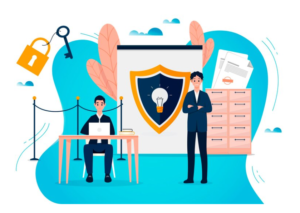VDR for Secure IP Exchanges: Protecting intellectual property (IP) is crucial in a world where business and technology change quickly. Enterprises are looking to Virtual Data Rooms (VDRs) as a strategic option because they need to share important information more rapidly and safely. This piece will discuss how important VDRs are for keeping intellectual property trades safe and the main features that make them essential for businesses in the digital age.
How VDRs Work and What Role They Play in IP Security: What Virtual Data Rooms (VDRs) Are
If you need to store and share private information during financial transactions, legal processes, or smart business partnerships, you can use a virtual data room or VDR. Authorized users can access, review, and share private data safely on these digital platforms because they provide a controlled environment.
The Important Link: VDRs and Protecting Intellectual Property
Intellectual property is very valuable in the fast-paced business world. Keeping things like patents, logos, copyrights, and trade secrets safe is important. Virtual data rooms (VDRs) protect intellectual property by providing a safe area where people can share, talk, and work together without risking private information.

Important Things That Make VDRs Great for IP Exchanges
1. More advanced encryption methods
If you want to send info safely, encryption is your first line of defense. Digital video recorders (VDRs) use cutting-edge security methods to protect data. So, even if someone gets in without permission, the info will still be safe and unreadable.
2. Controls for Granular Access
Not every shareholder needs the same amount of access. With granular access limits, VDRs let managers decide who can see, change, download, or share certain documents. This feature adds an extra layer of security to ensure that only the right people can access intellectual property.
3. Keeping track of activities and auditing
Intellectual property protection needs to know who viewed what information and when. VDRs have powerful tools for keeping track of behavior and auditing it. This openness makes people more accountable and helps find and fix possible security holes.
4. Moving watermarks
Via dynamic watermarking, VDRs often stop people from sharing or copying papers without permission. This function gives each document an extra layer of identification, so if it gets leaked or transmitted without permission, it can be traced back to where it came from.
How to Get Around in the VDR World: The Easy Way to Safely Exchange Intellectual Property
A VDR is not only a smart move for protecting intellectual property trades but is also useful. Thanks to simple features and easy-to-use platforms, switching to VDRs is a smooth process. Businesses can quickly switch to this digital option without losing time or money.
Getting the most out of collaboration while minimizing risks
Because businesses work together, many partners often contribute to the growth and safety of intellectual property. Virtual data rooms (VDRs) make working together easy by giving everyone a central place to share ideas, work on projects, and protect intellectual property.
Better efficiency in the due diligence process
Due diligence is an important step that involves thorough analysis and review of situations like mergers and acquisitions. VDRs speed up the due diligence process by making it easy for everyone involved to view and review important intellectual property papers. Because of this, the deal-making process goes faster, and all intellectual property parts are also carefully examined.
In conclusion: VDR for Secure IP Exchanges
Due to the constantly changing nature of business, protecting intellectual property is a must. Virtual data rooms are becoming the best way for firms to share intellectual property as they enter the digital age securely and securely. VDRs are a strong way to keep private data safe because they use advanced encryption, flexible access controls, activity tracking, and dynamic watermarking.
Businesses must use VDRs for more than security reasons as they continue using technology to grow and develop new ideas. VDRs are a must-have for any business that wants to protect its intellectual property in the digital age. They make the shift smooth, improve teamwork, and speed up the due diligence process. In a world where knowledge is power, VDRs protect intellectual property and ensure it stays in the hands of people who understand and value its importance.
FAQs on VDR for Secure IP Exchanges
When business people share private information, they must be very careful about keeping it safe. Many questions arise as Virtual Data Rooms (VDRs) become more popular for businesses to protect their intellectual property. This frequently asked questions (FAQ) section on “VDR for Secure Intellectual Property Exchanges” aims to help you understand how to use VDRs by explaining their purpose, benefits, and how to set them up to easily protect your valuable intellectual property. Find answers to your questions and fully understand how VDRs change how safe information is shared.

What does shared info look like?
Secure IP trades happen in Virtual Data Rooms (VDRs). Shared data usually includes private papers like legal agreements, financial records, and intellectual property files. These tools make controlled entry easier, so only the right people can work together on private information and look it over safely.
What is the main idea behind VDR?
Virtual private networks (VDRs) are based on making a safe and controlled digital space for sharing personal data. VDRs use advanced encryption, granular access controls, and activity tracking to keep the exchange of intellectual property in a safe area, lowering the risk of data leaks and illegal access.
What does VDR stand for?
Virtual Data Room is what VDR stands for. People store and share private data in this safe online database during business deals like mergers and acquisitions, court proceedings, and intellectual property exchanges.
How do I get info out of a VDR?
Finding information in a Virtual Data Room requires special permissions and using certain platform features. Users can usually download or remove single files or whole folders if they follow the rules set by admins. The process ensures the extraction is safe and follows the VDR’s rules.

